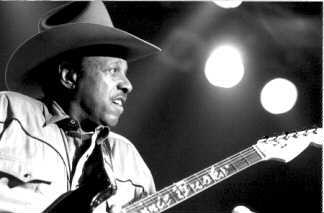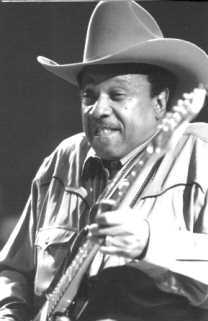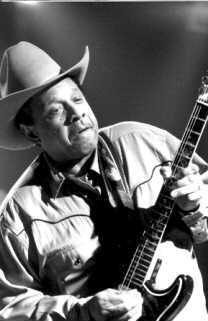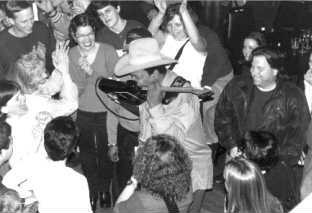 From his birth and upbringing in SW Louisiana to cutting his musical teeth in the Beaumont/Port Arthur area of East Texas where he was discovered playing guitar on his front porch by Clifton Chenier, to his touring with Sam Cooke and eventual move to the hotbed of postwar urban blues--Chicago, Lonnie Brooks has carved out a distinct blues heritage. Along with his two sons, Ronnie Baker Brooks and Wayne Baker Brooks, the Lonnie Brooks family is one of the successful blues families that continues to draw enthusiastic fans wherever they play.
From his birth and upbringing in SW Louisiana to cutting his musical teeth in the Beaumont/Port Arthur area of East Texas where he was discovered playing guitar on his front porch by Clifton Chenier, to his touring with Sam Cooke and eventual move to the hotbed of postwar urban blues--Chicago, Lonnie Brooks has carved out a distinct blues heritage. Along with his two sons, Ronnie Baker Brooks and Wayne Baker Brooks, the Lonnie Brooks family is one of the successful blues families that continues to draw enthusiastic fans wherever they play.

Lonnie Brooks was born Lee Baker, Jr., December 18, 1933 on a small farm in rural Louisiana near Dubuisson. He learned to play the blues from his banjo-picking grandfather but didn't think about a professional music career until he moved to Port Arthur, Texas in the early 1950's where he was exposed to the music of Clarence "Gatemouth" Brown, T. Bone Walker, B.B. King and Long John Hunter. It was there he also first met one of his musical heroes, Clifton Chenier. "I was sitting on a porch practicing on the guitar and he drove up and he saw me and come up there and asked who was I playing with. I said, 'I'm not good enough yet.' He said, 'you sound good to me. How about coming over to the house and lets jam.'" Chenier liked what he heard and the young Brooks wound up playing in Chenier's band over the next few years and went on to solo success recording a number of regional R&B hits including "The Crawl" and "Family Rules" under the name Guitar Junior.

In 1959, after touring with friend Sam Cooke, Lonnie moved to Chicago. He soon learned there already was another "Guitar Junior" (Luther Johnson) so he simply changed his name to avoid any confusion. Becoming infatuated with the sounds of deep Chicago blues, Lonnie soon landed a gig playing and recording with Jimmy Reed. You can hear Lonnie's guitar playing on the mega-hit "Big Boss Man." His big break came in 1978 when Alligator Records chose four of Brooks' songs to appear on the "Living Chicago Blues" anthology. This lead to the release of his first solo Alligator album, "Bayou Lightning" in 1979. Alligator has been his recording home ever since with his most recent album being "Roadhouse Rules" and the greatest hits "Lonnie Brooks Deluxe Edition" in 1997.
Brooks forges a unique mixture of Louisiana, Texas and Chicago blues unlike anyone else on the competitive Chicago blues scene where he has reigned as one of the Windy Cities' top bluesmen over the past three decades. Lonnie has a dynamic, singular quality to his voice that falls somewhere between hard core blues and smooth sounding soul. He plays a wicked and innovative guitar, is a gifted songwriter and consummate entertainer. In fact, his live performances are legendary, with the charismatic and good-natured Brooks always injecting a high level of energy and excitement into his shows that simply electrifies his audiences.

Lonnie's recent show at the Fine Line was another in a long succession of local appearances. I have never seen him give a bad performance. His shows are always entertaining and Lonnie sure knows how to squeeze out a slow blues as well as anyone.
This review is copyright © 2000 by Ray Stiles, and Blues On Stage, all rights reserved. Copy, duplication or download prohibited without written permission.
